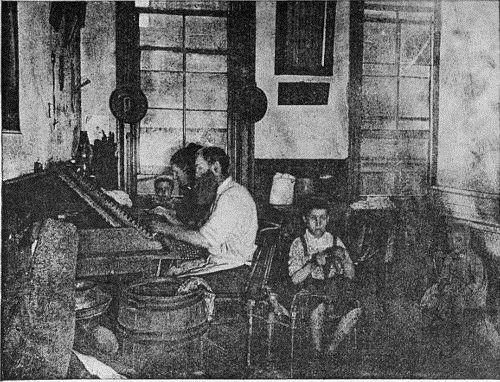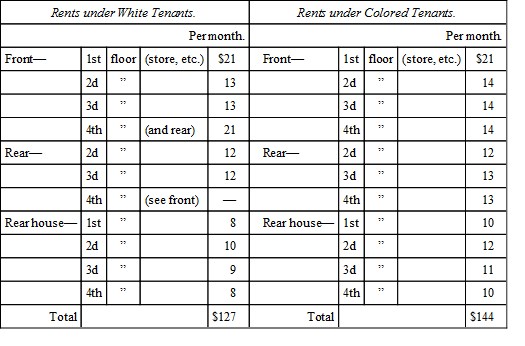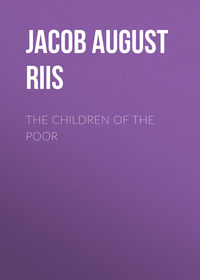 полная версия
полная версияHow the Other Half Lives: Studies Among the Tenements of New York
Men, women and children work together seven days in the week in these cheerless tenements to make a living for the family, from the break of day till far into the night. Often the wife is the original cigarmaker from the old home, the husband having adopted her trade here as a matter of necessity, because, knowing no word of English, he could get no other work. As they state the cause of the bitter hostility of the trades unions, she was the primary bone of contention in the day of the early Bohemian immigration. The unions refused to admit the women, and, as the support of the family depended upon her to a large extent, such terms as were offered had to be accepted. The manufacturer has ever since industriously fanned the antagonism between the unions and his hands, for his own advantage. The victory rests with him, since the Court of Appeals decided that the law, passed a few years ago, to prohibit cigarmaking in tenements was unconstitutional, and thus put an end to the struggle. While it lasted, all sorts of frightful stories were told of the shocking conditions under which people lived and worked in these tenements, from a sanitary point of view especially, and a general impression survives to this day that they are particularly desperate. The Board of Health, after a careful canvass, did not find them so then. I am satisfied from personal inspection, at a much later day, guided in a number of instances by the union cigarmakers themselves to the tenements which they considered the worst, that the accounts were greatly exaggerated. Doubtless the people are poor, in many cases very poor; but they are not uncleanly, rather the reverse; they live much better than the clothing-makers in the Tenth Ward, and in spite of their sallow look, that may be due to the all-pervading smell of tobacco, they do not appear to be less healthy than other in-door workers. I found on my tours of investigation several cases of consumption, of which one at least was said by the doctor to be due to the constant inhalation of tobacco fumes. But an examination of the death records in the Health Department does not support the claim that the Bohemian cigarmakers are peculiarly prone to that disease. On the contrary, the Bohemian percentage of deaths from consumption appears quite low. This, however, is a line of scientific inquiry which I leave others to pursue, along with the more involved problem whether the falling off in the number of children, sometimes quite noticeable in the Bohemian settlements, is, as has been suggested, dependent upon the character of the parents’ work. The sore grievances I found were the miserable wages and the enormous rents exacted for the minimum of accommodation. And surely these stand for enough of suffering.
Take a row of houses in East Tenth Street as an instance. They contained thirty-five families of cigarmakers, with probably not half a dozen persons in the whole lot of them, outside of the children, who could speak a word of English, though many had been in the country half a lifetime. This room with two windows giving on the street, and a rear attachment without windows, called a bedroom by courtesy, is rented at $12.25 a month. In the front room man and wife work at the bench from six in the morning till nine at night. They make a team, stripping the tobacco leaves together; then he makes the filler, and she rolls the wrapper on and finishes the cigar. For a thousand they receive $3.75, and can turn out together three thousand cigars a week. The point has been reached where the rebellion comes in, and the workers in these tenements are just now on a strike, demanding $5.00 and $5.50 for their work. The manufacturer having refused, they are expecting hourly to be served with notice to quit their homes, and the going of a stranger among them excites their resentment, until his errand is explained. While we are in the house, the ultimatum of the “boss” is received. He will give $3.75 a thousand, not another cent. Our host is a man of seeming intelligence, yet he has been nine years in New York and knows neither English nor German. Three bright little children play about the floor.
His neighbor on the same floor has been here fifteen years, but shakes his head when asked if he can speak English. He answers in a few broken syllables when addressed in German. With $11.75 rent to pay for like accommodation, he has the advantage of his oldest boy’s work besides his wife’s at the bench. Three properly make a team, and these three can turn out four thousand cigars a week, at $3.75. This Bohemian has a large family; there are four children, too small to work, to be cared for. A comparison of the domestic bill of fare between Tenth and Ludlow Streets result, in the discovery that this Bohemian’s butcher’s bill for the week, with meat at twelve cents a pound as in Ludlow Street, is from two dollars and a half to three dollars. The Polish Jew fed as big a family on one pound of meat a day. The difference proves to be typical. Here is a suit of three rooms, two dark, three flights up. The ceiling is partly down in one of the rooms. “It is three months since we asked the landlord to fix it,” says the oldest son, a very intelligent lad who has learned English in the evening school. His father has not had that advantage, and has sat at his bench, deaf and dumb to the world about him except his own, for six years. He has improved his time and become an expert at his trade. Father, mother, and son together, a full team, make from fifteen to sixteen dollars a week.
A man with venerable beard and keen eyes answers our questions through an interpreter, in the next house. Very few brighter faces would be met in a day’s walk among American mechanics, yet he has in nine years learned no syllable of English. German he probably does not want to learn. His story supplies the explanation, as did the stories of the others. In all that time he has been at work grubbing to earn bread. Wife and he by constant labor make three thousand cigars a week, earning $11.25 when there is no lack of material; when in winter they receive from the manufacturer tobacco for only two thousand, the rent of $10 for two rooms, practically one with a dark alcove, has nevertheless to be paid in full, and six mouths to be fed. He was a blacksmith in the old country, but cannot work at his trade here because he does not understand “Engliska.” If he could, he says, with a bright look, he could do better work than he sees done here. It would seem happiness to him to knock off at 6 o’clock instead of working, as he now often has to do, till midnight. But how? He knows of no Bohemian blacksmith who can understand him; he should starve. Here, with his wife, he can make a living at least. “Aye,” says she, turning, from listening, to her household duties, “it would be nice for sure to have father work at his trade.” Then what a home she could make for them, and how happy they would be. Here is an unattainable ideal, indeed, of a workman in the most prosperous city in the world! There is genuine, if unspoken, pathos in the soft tap she gives her husband’s hand as she goes about her work with a half-suppressed little sigh.

BOHEMIAN CIGARMAKERS AT WORK IN THEIR TENEMENT.
The very ash-barrels that stand in front of the big rows of tenements in Seventy-first and Seventy-third Streets advertise the business that is carried on within. They are filled to the brim with the stems of stripped tobacco leaves. The rank smell that waited for us on the corner of the block follows us into the hallways, penetrates every nook and cranny of the houses. As in the settlement farther down town, every room here has its work-bench with its stumpy knife and queer pouch of bed-tick, worn brown and greasy, fastened in front the whole length of the bench to receive the scraps of waste. This landlord-employer at all events gives three rooms for $12.50, if two be dark, one wholly and the other getting some light from the front room. The mother of the three bare-footed little children we met on the stairs was taken to the hospital the other day when she could no longer work. She will never come out alive. There is no waste in these tenements. Lives, like clothes, are worn through and out before put aside. Her place at the bench is taken already by another who divides with the head of the household his earnings of $15.50 a week. He has just come out successful of a strike that brought the pay of these tenements up to $4.50 per thousand cigars. Notice to quit had already been served on them, when the employer decided to give in, frightened by the prospective loss of rent. Asked how long he works, the man says: “from they can see till bed-time.” Bed-time proves to be eleven o’clock. Seventeen hours a day, seven days in the week, at thirteen cents an hour for the two, six cents and a half for each! Good average earnings for a tenement-house cigarmaker in summer. In winter it is at least one-fourth less. In spite of it all, the rooms are cleanly kept. From the bedroom farthest back the woman brings out a pile of moist tobacco-leaves to be stripped. They are kept there, under cover lest they dry and crack, from Friday to Friday, when an accounting is made and fresh supplies given out. The people sleep there too, but the smell, offensive to the unfamiliar nose, does not bother them. They are used to it.
In a house around the corner that is not a factory-tenement, lives now the cigarmaker I spoke of as suffering from consumption which the doctor said was due to the tobacco-fumes. Perhaps the lack of healthy exercise had as much to do with it. His case is interesting from its own stand-point. He too is one with a—for a Bohemian—large family. Six children sit at his table. By trade a shoemaker, for thirteen years he helped his wife make cigars in the manufacturer’s tenement. She was a very good hand, and until his health gave out two years ago they were able to make from $17 to $25 a week, by lengthening the day at both ends. Now that he can work no more, and the family under the doctor’s orders has moved away from the smell of tobacco, the burden of its support has fallen upon her alone, for none of the children are old enough to help. She has work in the shop at eight dollars a week, and this must go round; it is all there is. Happily, this being a tenement for revenue only, unmixed with cigars, the rent is cheaper: seven dollars for two bright rooms on the top floor. No housekeeping is attempted. A woman in Seventy-second Street supplies their cooking, which the wife and mother fetches in a basket, her husband being too weak. Breakfast of coffee and hard-tack, or black bread, at twenty cents for the whole eight; a good many, the little woman says with a brave, patient smile, and there is seldom anything to spare, but–. The invalid is listening, and the sentence remains unfinished. What of dinner? One of the children brings it from the cook. Oh! it is a good dinner, meat, soup, greens and bread, all for thirty cents. It is the principal family meal. Does she come home for dinner? No; she cannot leave the shop, but gets a bite at her bench. The question: A bite of what? seems as merciless as the surgeon’s knife, and she winces under it as one shrinks from physical pain. Bread, then. But at night they all have supper together—sausage and bread. For ten cents they can eat all they want. Can they not? she says, stroking the hair of the little boy at her knee; his eyes glisten hungrily at the thought, as he nods stoutly in support of his mother. Only, she adds, the week the rent is due, they have to shorten rations to pay the landlord.
But what of his being an Anarchist, this Bohemian—an infidel—I hear somebody say. Almost one might be persuaded by such facts as these—and they are everyday facts, not fancy—to retort: what more natural? With every hand raised against him in the old land and the new, in the land of his hoped-for freedom, what more logical than that his should be turned against society that seems to exist only for his oppression? But the charge is not half true. Naturally the Bohemian loves peace, as he loves music and song. As someone has said: He does not seek war, but when attacked knows better how to die than how to surrender. The Czech is the Irishman of Central Europe, with all his genius and his strong passions, with the same bitter traditions of landlord-robbery, perpetuated here where he thought to forget them; like him ever and on principle in the opposition, “agin the government” wherever he goes. Among such a people, ground by poverty until their songs have died in curses upon their oppressors, hopelessly isolated and ignorant of our language and our laws, it would not be hard for bad men at any time to lead a few astray. And this is what has been done. Yet, even with the occasional noise made by the few, the criminal statistics already alluded to quite dispose of the charge that they incline to turbulence and riot. So it is with the infidel propaganda, the legacy perhaps of the fierce contention through hundreds of years between Catholics and Protestants on Bohemia’s soil, of bad faith and savage persecutions in the name of the Christians’ God that disgrace its history. The Bohemian clergyman, who spoke for his people at the Christian Conference held in Chickering Hall two years ago, took even stronger ground. “They are Roman Catholics by birth, infidels by necessity, and Protestants by history and inclination,” he said. Yet he added his testimony in the same breath to the fact that, though the Freethinkers had started two schools in the immediate neighborhood of his church to counteract its influence, his flock had grown in a few years from a mere handful at the start to proportions far beyond his hopes, gathering in both Anarchists and Freethinkers, and making good church members of them.
Thus the whole matter resolves itself once more into a question of education, all the more urgent because these people are poor, miserably poor almost to a man. “There is not,” said one of them, who knew thoroughly what he was speaking of, “there is not one of them all, who, if he were to sell all he was worth to-morrow, would have money enough to buy a house and lot in the country.”
CHAPTER XIII.
THE COLOR LINE IN NEW YORK
The color line must be drawn through the tenements to give the picture its proper shading. The landlord does the drawing, does it with an absence of pretence, a frankness of despotism, that is nothing if not brutal. The Czar of all the Russias is not more absolute upon his own soil than the New York landlord in his dealings with colored tenants. Where he permits them to live, they go; where he shuts the door, stay out. By his grace they exist at all in certain localities; his ukase banishes them from others. He accepts the responsibility, when laid at his door, with unruffled complacency. It is business, he will tell you. And it is. He makes the prejudice in which he traffics pay him well, and that, as he thinks it quite superfluous to tell you, is what he is there for.
That his pencil does not make quite as black a mark as it did, that the hand that wields it does not bear down as hard as only a short half dozen years ago, is the hopeful sign of an awakening public conscience under the stress of which the line shows signs of wavering. But for this the landlord deserves no credit. It has come, is coming about despite him. The line may not be wholly effaced while the name of the negro, alone among the world’s races, is spelled with a small n. Natural selection will have more or less to do beyond a doubt in every age with dividing the races; only so, it may be, can they work out together their highest destiny. But with the despotism that deliberately assigns to the defenceless Black the lowest level for the purpose of robbing him there that has nothing to do. Of such slavery, different only in degree from the other kind that held him as a chattel, to be sold or bartered at the will of his master, this century, if signs fail not, will see the end in New York.
Ever since the war New York has been receiving the overflow of colored population from the Southern cities. In the last decade this migration has grown to such proportions that it is estimated that our Blacks have quite doubled in number since the Tenth Census. Whether the exchange has been of advantage to the negro may well be questioned. Trades of which he had practical control in his Southern home are not open to him here. I know that it may be answered that there is no industrial proscription of color; that it is a matter of choice. Perhaps so. At all events he does not choose then. How many colored carpenters or masons has anyone seen at work in New York? In the South there are enough of them and, if the testimony of the most intelligent of their people is worth anything, plenty of them have come here. As a matter of fact the colored man takes in New York, without a struggle, the lower level of menial service for which his past traditions and natural love of ease perhaps as yet fit him best. Even the colored barber is rapidly getting to be a thing of the past. Along shore, at any unskilled labor, he works unmolested; but he does not appear to prefer the job. His sphere thus defined, he naturally takes his stand among the poor, and in the homes of the poor. Until very recent times—the years since a change was wrought can be counted on the fingers of one hand—he was practically restricted in the choice of a home to a narrow section on the West Side, that nevertheless had a social top and bottom to it—the top in the tenements on the line of Seventh Avenue as far north as Thirty-second Street, where he was allowed to occupy the houses of unsavory reputation which the police had cleared and for which decent white tenants could not be found; the bottom in the vile rookeries of Thompson Street and South Fifth Avenue, the old “Africa” that is now fast becoming a modern Italy. To-day there are black colonies in Yorkville and Morrisania. The encroachment of business and the Italian below, and the swelling of the population above, have been the chief agents in working out his second emancipation, a very real one, for with his cutting loose from the old tenements there has come a distinct and gratifying improvement in the tenant, that argues louder than theories or speeches the influence of vile surroundings in debasing the man. The colored citizen whom this year’s census man found in his Ninety-ninth Street “flat” is a very different individual from the “nigger” his predecessor counted in the black-and-tan slums of Thompson and Sullivan Streets. There is no more clean and orderly community in New York than the new settlement of colored people that is growing up on the East Side from Yorkville to Harlem.
Cleanliness is the characteristic of the negro in his new surroundings, as it was his virtue in the old. In this respect he is immensely the superior of the lowest of the whites, the Italians and the Polish Jews, below whom he has been classed in the past in the tenant scale. Nevertheless, he has always had to pay higher rents than even these for the poorest and most stinted rooms. The exceptions I have come across, in which the rents, though high, have seemed more nearly on a level with what was asked for the same number and size of rooms in the average tenement, were in the case of tumble-down rookeries in which no one else would live, and were always coupled with the condition that the landlord should “make no repairs.” It can readily be seen, that his profits were scarcely curtailed by his “humanity.” The reason advanced for this systematic robbery is that white people will not live in the same house with colored tenants, or even in a house recently occupied by negroes, and that consequently its selling value is injured. The prejudice undoubtedly exists, but it is not lessened by the house agents, who have set up the maxim “once a colored house, always a colored house.”
There is method in the maxim, as shown by an inquiry made last year by the Real Estate Record. It proved agents to be practically unanimous in the endorsement of the negro as a clean, orderly, and “profitable” tenant. Here is the testimony of one of the largest real estate firms in the city: “We would rather have negro tenants in our poorest class of tenements than the lower grades of foreign white people. We find the former cleaner than the latter, and they do not destroy the property so much. We also get higher prices. We have a tenement on Nineteenth Street, where we get $10 for two rooms which we could not get more than $7.50 for from white tenants previously. We have a four-story tenement on our books on Thirty-third Street, between Sixth and Seventh Avenues, with four rooms per floor—a parlor, two bedrooms, and a kitchen. We get $20 for the first floor, $24 for the second, $23 for the third and $20 for the fourth, in all $87 or $1,044 per annum. The size of the building is only 21+55.” Another firm declared that in a specified instance they had saved fifteen to twenty per cent. on the gross rentals since they changed their white tenants for colored ones. Still another gave the following case of a front and rear tenement that had formerly been occupied by tenants of a “low European type,” who had been turned out on account of filthy habits and poor pay. The negroes proved cleaner, better, and steadier tenants. Instead, however, of having their rents reduced in consequence, the comparison stood as follows:

An increased rental of $17 per month, or $204 a year, and an advance of nearly thirteen and one-half per cent. on the gross rental “in favor” of the colored tenant. Profitable, surely!
I have quoted these cases at length in order to let in light on the quality of this landlord despotism that has purposely confused the public mind, and for its own selfish ends is propping up a waning prejudice. It will be cause for congratulation if indeed its time has come at last. Within a year, I am told by one of the most intelligent and best informed of our colored citizens, there has been evidence, simultaneous with the colored hegira from the low down-town tenements, of a movement toward less exorbitant rents. I cannot pass from this subject without adding a leaf from my own experience that deserves a place in this record, though, for the credit of humanity, I hope as an extreme case. It was last Christmas that I had occasion to visit the home of an old colored woman in Sixteenth Street, as the almoner of generous friends out of town who wished me to buy her a Christmas dinner. The old woman lived in a wretched shanty, occupying two mean, dilapidated rooms at the top of a sort of hen-ladder that went by the name of stairs. For these she paid ten dollars a month out of her hard-earned wages as a scrub-woman. I did not find her in and, being informed that she was “at the agent’s,” went around to hunt her up. The agent’s wife appeared, to report that Ann was out. Being in a hurry it occurred to me that I might save time by making her employer the purveyor of my friend’s bounty, and proposed to entrust the money, two dollars, to her to be expended for Old Ann’s benefit. She fell in with the suggestion at once, and confided to me in the fullness of her heart that she liked the plan, inasmuch as “I generally find her a Christmas dinner myself, and this money—she owes Mr. – (her husband, the agent) a lot of rent.” Needless to state that there was a change of programme then and there, and that Ann was saved from the sort of Christmas cheer that woman’s charity would have spread before her. When I had the old soul comfortably installed in her own den, with a chicken and “fixin’s” and a bright fire in her stove, I asked her how much she owed of her rent. Her answer was that she did not really owe anything, her month not being quite up, but that the amount yet unpaid was—two dollars!
Poverty, abuse, and injustice alike the negro accepts with imperturbable cheerfulness. His philosophy is of the kind that has no room for repining. Whether lie lives in an Eighth Ward barrack or in a tenement with a brown-stone front and pretensions to the title of “flat,” he looks at the sunny side of life and enjoys it. He loves fine clothes and good living a good deal more than he does a bank account. The proverbial rainy day it would be rank ingratitude, from his point of view, to look for when the sun shines unclouded in a clear sky. His home surroundings, except when he is utterly depraved, reflect his blithesome temper. The poorest negro housekeeper’s room in New York is bright with gaily-colored prints of his beloved “Abe Linkum,” General Grant, President Garfield, Mrs. Cleveland, and other national celebrities, and cheery with flowers and singing birds. In the art of putting the best foot foremost, of disguising his poverty by making a little go a long way, our negro has no equal. When a fair share of prosperity is his, he knows how to make life and home very pleasant to those about him. Pianos and parlor furniture abound in the uptown homes of colored tenants and give them a very prosperous air. But even where the wolf howls at the door, he makes a bold and gorgeous front. The amount of “style” displayed on fine Sundays on Sixth and Seventh Avenues by colored holiday-makers would turn a pessimist black with wrath. The negro’s great ambition is to rise in the social scale to which his color has made him a stranger and an outsider, and he is quite willing to accept the shadow for the substance where that is the best he can get. The claw-hammer coat and white tie of a waiter in a first-class summer hotel, with the chance of taking his ease in six months of winter, are to him the next best thing to mingling with the white quality he serves, on equal terms. His festive gatherings, pre-eminently his cake-walks, at which a sugared and frosted cake is the proud prize of the couple with the most aristocratic step and carriage, are comic mixtures of elaborate ceremonial and the joyous abandon of the natural man. With all his ludicrous incongruities, his sensuality and his lack of moral accountability, his superstition and other faults that are the effect of temperament and of centuries of slavery, he has his eminently good points. He is loyal to the backbone, proud of being an American and of his new-found citizenship. He is at least as easily moulded for good as for evil. His churches are crowded to the doors on Sunday nights when the colored colony turns out to worship. His people own church property in this city upon which they have paid half a million dollars out of the depth of their poverty, with comparatively little assistance from their white brethren. He is both willing and anxious to learn, and his intellectual status is distinctly improving. If his emotions are not very deeply rooted, they are at least sincere while they last, and until the tempter gets the upper hand again.









